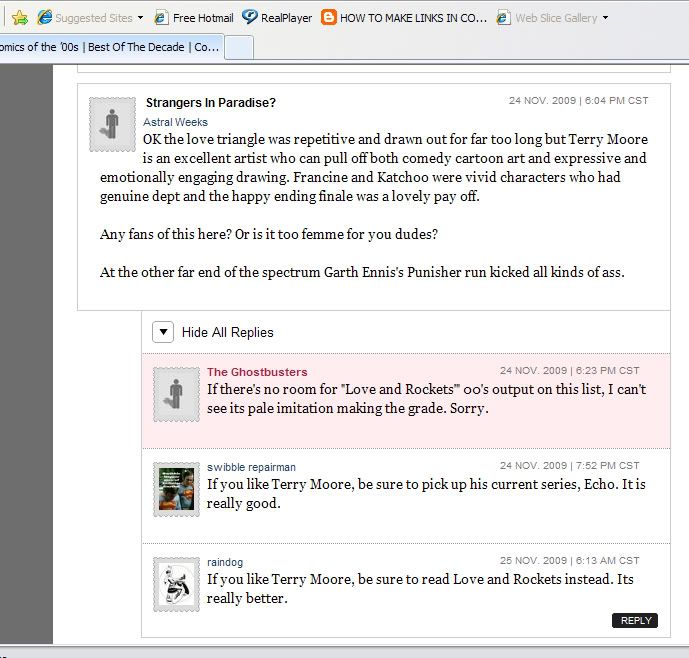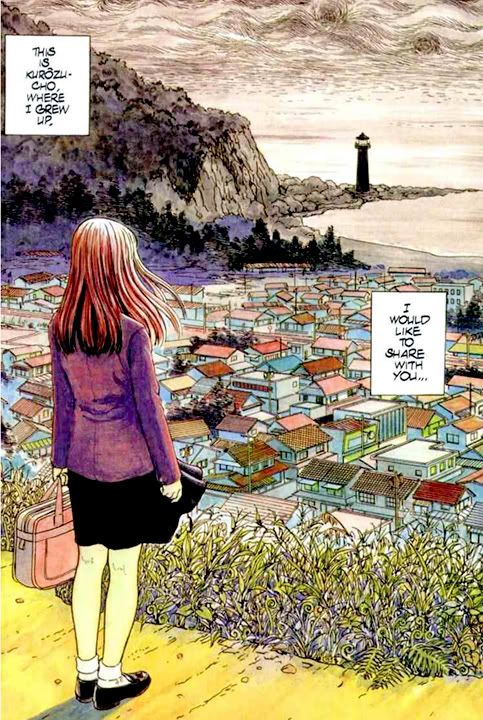Here's a
snappy essay pointing out various flaws in the Onion A/V Club's "Best Comics of the 00's" list. It mentions some of the Japanese works that really should have been on that list. A list of "best of" comics that doesn't include Japanese works is intrinsically flawed. Actually, all "best of" lists suffer from being exclusionary by their very nature. Not everything can get on a limited list. But this one has a pretty big fault, roughly the size of that famous one in California that so worried Lex Luthor-- it ignores the majority of comics in the entire world.
The comments make for some great reading, as well. Specifically because Noel Murray of the
A/V Club makes an appearance to discuss all the furor the list has generated. Murray's one of my favorite
A/V Club staffers and I always enjoy his reviews. Let's look at what he's saying:
"Well, if someone made a "Best Music of the '00s, Except Hip Hop, Because Not Everyone Listens to Hip Hop, And That's Totally Fine" list, I think people would be calling bullroar on that too."
What if you released a list of Best Music Of The '00s and included no classical? Because that's actually fairly common.
If
Rolling Stone or
Spin releases a "best music" list with no classical or jazz, it wouldn't be nearly so surprising as it would be if they left off hip hop-- although they may stick some select classical titles on there just to cover their asses. If
The Source releases a list that's totally hip hop, or
Vibe releases a similar list that was entirely hip hop or R&B with no college radio rock or country music, who could argue with their logic?
But if
Time magazine or
Entertainment Weekly releases a "best of music" list without including classical, jazz or hip hop... something would be pretty stinky. And people would quite rightly don gas masks or at least clothes pins (do those even help, outside of cartoons?) when approaching the list.
The Onion A/V Club is a more general pop culture media outlet, so the manga exclusion is pretty obvious.
Our comics coverage has always been manga-lite, but I'm not sure "don't care" is the right word. We dabble; we just don't delve. But again, your criticism is fair, and perhaps we should look into finding someone more manga-literate to supplement our future coverage.
Not necessary, actually. "Manga-literacy" is a redundancy. Literacy will suffice, and the
A/V Club obviously has tons of that. Just read some Japanese comics with the same critical eye you read Western works. You don't have to approach manga as if it's an alien species. I don't read a manga and judge it based on manga tropes or even a vast understanding of Japanese culture; I read it and judge it based on my experience reading literature of all kinds, prose included. In fact, that's the standard by which I judge any comic I read.
I do take issue with the idea that lists like this don't "help anybody" though. I go back to my earlier comment: It depends on who you think lists like this are designed for. If you're deeply into comics, you're right, our list probably just confirms what you already know. If you read comics casually, you're likely to find some new things to check out. And if you're a complete novice... well, I offer a variation on what I asked Sean earlier: Do you not feel that the books on this list are, generally speaking, well-worth a reader's time?
I'm agree with Noel on some of these points. These lists are not only helpful-- perhaps even more so when fatally flawed like this one-- but almost always entertaining. Except... by leaving out manga from the list, you've accidentally cut this hypothetical "casual reader" off from most of comics culture. And some of the absolute best comics creators and their work. Takahashi Rumiko, Yazawa Ai, Ito Junji, Tezuka Osamu, Koike Kazuo and so many more; we're not talking about the merely good-- these are world class creators who have impacted the overal medium to a level that would probably shock the Ameri-centric comic book reader.
Like me. When I discovered this, I realized I'd been living in a comic book cell, like a cloistered monk who eventually forgets there's a sun causing that shaft of light that travels up the wall every day.
It's exactly like making a best of list and neglecting Alan Moore, Jack Kirby, Stan Lee, Warren Ellis, Los Bros Hernandez, Robert Crumb, Moebius and so forth. Oops!
And I definitely think the list's selections are worthy. The many I've read really did rock my socks. Again, it's not what's on there that's the problem. It's the absence of a huge chunk of comics that should be on there-- and not the individual ones we always have qualms about (
Walking Dead, for example, is one of my top 10 comics of the past decade, and it received a mention but also didn't make the list), but specifically the lack of manga inclusion.
At the least, the list has sparked some good discussions, especially at our site, where we're almost to 600 comments. And if it's revealed that we tend to range too narrow in our scope, that's valuable criticism to hear.
Absolutely. That's really the only point I wanted to make about the list, too narrow a scope given the time span covered and the nature of the
A/V Club itself. It's time to embrace ALL comics as comics, not as separate entities.
Putting out an opinion and getting people discussing it is a function of making these kinds of lists on the
A/V Club, right? I'd say mission accomplished. In this respect, at least, the
Onion A/V Club's list is perfect. And I don't mean that ironically. This kind of discourse
is helpful. And fun! I know I've thoroughly enjoyed it.
This has been the most entertaining couple of days I've had as a comics fan since Eddie Berganza defended
Supergirl.
Anyway, I seriously doubt Noel Murray will read this-- or much of anybody for that matter-- but I appreciate the way he's taken time to discuss the reaction with people and the way in which he's done it. And just because I like to snark a bit here and there, I hope my reader doesn't think any of my response is based on that ol' Internet rage. When we're talking comics sometimes we have to clarify this, and that's kind of depressing.
In closing--
Nana. Buy it, Noel.

 Yesterday was a cold, rainy day. The kind my mom would call "dreary." I had to bike it back to my apartment during my dinner break and decided to eat at MosBurger on my way back to work. Which meant I needed a book to read while eating a teriyaki chicken burger. I tried Charles Portis' True Grit (the upcoming Coen Brothers version has me interested in the novel again) and then briefly considered Haruki Murakami's After Dark. Instead, I chose the only other book handy that would fit in my pocket-- it had to fit there so I could keep it dry underneath my clear plastic raincoat and winter jacket...
Yesterday was a cold, rainy day. The kind my mom would call "dreary." I had to bike it back to my apartment during my dinner break and decided to eat at MosBurger on my way back to work. Which meant I needed a book to read while eating a teriyaki chicken burger. I tried Charles Portis' True Grit (the upcoming Coen Brothers version has me interested in the novel again) and then briefly considered Haruki Murakami's After Dark. Instead, I chose the only other book handy that would fit in my pocket-- it had to fit there so I could keep it dry underneath my clear plastic raincoat and winter jacket... I learned from the artist himself this weekend plans are afoot for a reprinting of Michael Golden's wickedly cool Jackie Chan comic series Spartan X, with a conclusion to the story arc left incomplete by its unfortunate demise.
I learned from the artist himself this weekend plans are afoot for a reprinting of Michael Golden's wickedly cool Jackie Chan comic series Spartan X, with a conclusion to the story arc left incomplete by its unfortunate demise.
